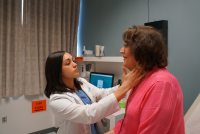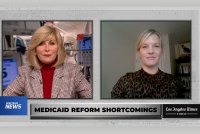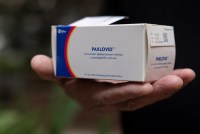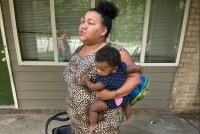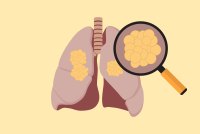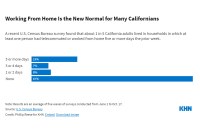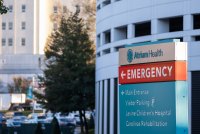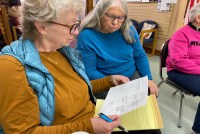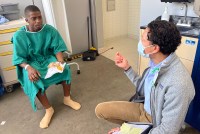Latest KFF Health News Stories
Transgender People in Rural America Struggle to Find Doctors Willing or Able to Provide Care
Many health professionals in rural areas don’t know how to provide gender-affirming care, leaving transgender patients with few options.
Bleeding and in Pain, a Pregnant Woman in Louisiana Couldn’t Get Answers
How one Louisiana woman experiencing a miscarriage sought care amid a climate of fear and confusion among doctors fueled by that state’s restrictive abortion law.
Sueño alterado y nervios de punta: la contaminación acústica afecta la mente y el cuerpo
Décadas de investigación vinculan la contaminación acústica no solo con la interrupción del sueño, sino también con una serie de afecciones crónicas, como enfermedades cardíacas, deterioro cognitivo, depresión y ansiedad.
Lost Sleep and Jangled Nerves: The Rising Onslaught of Noise Harms Mind and Body
Noise pollution is a growing problem that isn’t confined to the ears: It can cause harm throughout the body. California is taking baby steps to address the increasing din from traffic and illegally modified cars, but public health experts urge lawmakers to act more boldly.
From Her View in Knoxville, the Health System Is ‘Not Designed for Poor People’
Monica Reed was the first in her family to own a home and has lived “a frugal kind of life.” Cancer treatment left her with almost $10,000 in debt, pushing her to the edge financially.
More States to Consider Extending Postpartum Medicaid Coverage Beyond Two Months
Fifteen states haven’t moved to extend Medicaid coverage for new moms beyond the minimum of 60 days after birth. But at least four of those holdout states — Montana, Wyoming, Missouri, and Mississippi — are expected to consider proposals to extend coverage in their upcoming legislative sessions.
Watch: Big Medicaid Changes in California Leave Millions of Patients Behind
KHN senior correspondent Angela Hart discusses how California’s big Medicaid experiment to bring social services to the sickest and costliest patients doesn’t help most patients.
Paxlovid Has Been Free So Far. Next Year, Sticker Shock Awaits.
The government soon will stop paying for the covid drug that has proved to be the most effective at keeping patients alive and out of the hospital.
Colorado Option’s Big Test: Open Enrollment
Critics were ready to bury the state’s new health insurance plans, based on a public option, when 2023 rate hikes were announced, but officials are confident people will be drawn to the plans’ benefits.
Her Apartment Might Have Put Her Son’s Health at Risk. But ‘I Have Nowhere Else to Go.’
The United States is suffering from a severe shortage of affordable housing. But elected officials have done little to fix a problem that puts many Americans at greater risk for sickness and shortens lives.
Racial Disparities in Lung Cancer Start With Research
Improving lung cancer outcomes in Black communities will take more than lowering the screening age, experts say. Disparities are present in everything from the studies that inform when people should get checked to the availability of care in rural areas.
A Work-From-Home Culture Takes Root in California
New U.S. Census Bureau data shows a large segment of Californians are working from home for part or all of the week. Researchers say the shift will ripple through the broader economy in ways big and small.
How Banks and Private Equity Cash In When Patients Can’t Pay Their Medical Bills
Hospitals strike deals with financing companies, generating profits for lenders, and more debt for patients.
Knoxville’s Black Community Endured Deeply Rooted Racism. Now There Is Medical Debt.
Despite the end of Jim Crow segregation, its legacy lives on in medical debt that disproportionately burdens Black communities.
Campaigning Ramps Up as South Dakota Voters Decide on Medicaid Expansion
A broad coalition of Medicaid expansion supporters faces off against a smaller group of opponents as early voting begins on a constitutional amendment that would increase coverage under South Dakota’s program.
‘Separate and Unequal’: Critics Say Newsom’s Pricey Medicaid Reforms Leave Most Patients Behind
MLK Community Hospital in South Los Angeles is surrounded by poverty, homeless encampments, and food deserts. Even though California Gov. Gavin Newsom is funneling billions of taxpayer money into an ambitious initiative to provide some low-income patients with social services, hospital executives and other critics say it won’t improve access to basic care.
Reporter Follows Up on ‘Cancer Moonshot’ Progress and the Bias in Digital Health Records
KHN and California Healthline staff made the rounds on national and local media this week to discuss their stories. Here’s a collection of their appearances.
Abortion Bans Skirt a Medical Reality: For Many Teens, Childbirth Is a Dangerous Undertaking
The laws criminalizing abortion in many conservative U.S. states are expected to boost birth rates among teens, whose bodies often aren’t built for safe childbirth. For adolescents, the emotional and physical challenges of carrying a pregnancy to term can be daunting.
Embedded Bias: How Medical Records Sow Discrimination
Medical records can contain seemingly objective descriptions that are actually full of coded language and subtext. How does that affect care?
Many Refugees Dealing With Trauma Face Obstacles to Mental Health Care
Refugees are arriving in the U.S. in greater numbers after a 40-year low, prompting some health professionals to rethink ways to provide culturally competent care amid a shortage of mental health services.



